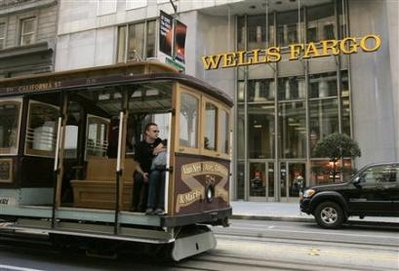 A cable car passes a Wells Fargo bank building along California Street in San Francisco, California October 7, 2008.[Agencies]
A cable car passes a Wells Fargo bank building along California Street in San Francisco, California October 7, 2008.[Agencies] |
Wachovia is among many regional banks that found themselves at the fore of the credit crisis, holding large portfolios of toxic mortgages as the value of borrowers' homes dropped and they became unable to pay their loans.
Citigroup, Wells Fargo, and the Federal Reserve had spent days negotiating over the future of Wachovia and its valuable network of branches.
Citigroup agreed last week to buy Wachovia's banking assets for about $2.2 billion, with partial government assistance, and it financially supported Wachovia while they hammered out final details.
But days later, Wells Fargo signed an agreement to buy all of Wachovia for about $15 billion at the time, including its asset management and retail brokerage arms. The recent slide in Wells Fargo shares puts the value closer to $12 billion, based on Thursday's closing price.
Wells and Citigroup fought in court last weekend, but on Monday agreed to suspend litigation -- a suspension that had been due to expire on Wednesday at noon.
That deadline was extended in consultation with the Federal Reserve to Friday, October 10, at 8 am.
But late on Thursday Citi said it had ended the talks with no agreement.
A source close to Citigroup said one of the sticking points was over how the two sides viewed the risks involved in taking over Wachovia's Golden West portfolio.
Wachovia has a $122 billion portfolio of option adjustable-rate mortgages that it largely inherited when it bought California lender Golden West Financial Corp in 2006.
The two sides could not agree on the degree of losses that portfolio could cause.
"I am not sure that there was agreement on how risky that portfolio was," the source said. "You have to be able to reach some mutually acceptable agreement on how the risks are going to be managed."
In addition, another source familiar with the situation said Citi had structured its initial deal to buy Wachovia's operations, but not the bank holding company, because of concern about a shareholder lawsuit related to the bank's ill-fated acquisition of California thrift Golden West.
Wachovia had been unable to quantify potential losses from that suit, the source said.
Wachovia said it was "pleased" that Citi ended efforts to stop it from merging with Wells Fargo.
Sheila Bair, chairman of the Federal Deposit Insurance Corp, praised Citi's decision in a statement, saying it brought "needed certainty" to the situation.
Citi reiterated that it believes it has strong legal claims against Wachovia and Wells Fargo for breach of contract and tortious interference with contract. Earlier this week, the bank said it was seeking up to $60 billion in damages from San Francisco-based Wells Fargo.
On Thursday, Citi said it planned to pursue the claims "vigorously" even while abandoning earlier efforts at a court order blocking the Wells takeover.
Wells Fargo has managed to remain profitable during the credit crisis, while Citi is looking to turn around its business after posting about $60 billion in write-downs and losses during the year.
Citi did say it remained willing to complete its original deal, but some industry experts believe that is unlikely.
"That looks as if it probably won't happen," said Michael Holland, founder of Holland & Co, which oversees more than $4 billion. "At the end, my best bet is that Well's deal is the best economic and political deal and something gets done there."

